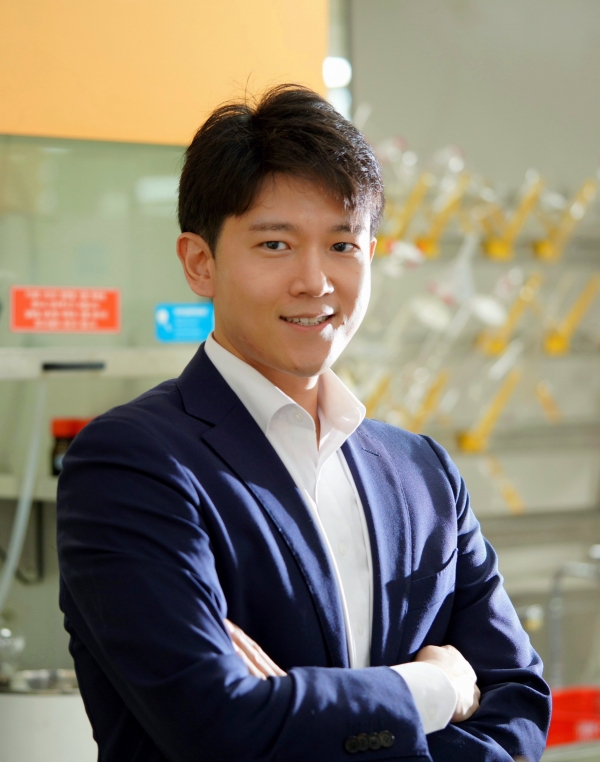The Postech Times interviewed Professor Hyunwoo Kim in the Chemistry department.

Please introduce students to the research and advantages of the Sustainable Catalysis & Synthesis Lab.
At the Sustainable Catalysis & Synthesis Lab, we are committed to advancing the realms of photochemical and electrochemical organic synthesis. Our primary goal is to redefine photocatalysis and electrocatalysis, enabling the efficient synthesis of value-added molecules from raw chemical feedstock.
We endeavor to pioneer a fresh conceptual framework, pushing the boundaries of photochemical and electrochemical synthetic organic methodologies. By exploring innovative approaches, we strive to contribute to the creation of sustainable and economically feasible pathways in organic synthesis, utilizing state-of-the-art photochemical and electrocatalytic techniques.
Furthermore, we are concurrently conducting research that applies insights gleaned from the electrochemical behavior of organic and organometallic molecules observed in these processes to the development of organic-based battery materials such as organic electrolytes and solvents.
If you have any reasons or attractions for your interest in sustainable organic reactions, please introduce them.
My interest in sustainable organic reactions stemmed from a deep curiosity about how chemical transformations can be made more efficient and environmentally friendly. Traditional organic synthesis often relies on harsh conditions, hazardous reagents, and energy-intensive processes. However, photochemical and electrochemical methods offer a more sustainable alternative, leveraging renewable energy sources and minimizing waste. The most captivating aspect of this field is its interdisciplinary nature—combining principles of organic chemistry, materials science, and electrochemistry to develop innovative and green synthetic methodologies. The potential to revolutionize chemical manufacturing and contribute to a more sustainable future continues to drive my passion for this research.
Are there any strategies students who aspire to research organic materials should develop or challenges that students must experience?
For students aspiring to research organic materials, it is crucial to develop a strong foundation in organic chemistry, physical chemistry, and materials science. Gaining hands-on experience in laboratory techniques, including synthesis, purification, and characterization of organic compounds, is essential. Additionally, familiarity with analytical tools such as NMR, UV-Vis, and electrochemical methods will be highly beneficial. Beyond technical skills, problem-solving ability, critical thinking, and perseverance are vital traits for success in research. Students should embrace challenges, engage in independent research projects, and cultivate the ability to interpret experimental data rigorously. Lastly, interdisciplinary collaboration and effective communication—both written and verbal—will help them convey their findings clearly and contribute meaningfully to scientific advancements.
There is a saying that there is no useless experience. Introduce us to some unique experiences or challenges in the past that have helped you with your research.
One of the most influential experiences in my research journey was working on electrochemical organic synthesis early in my career. Initially, the field presented many challenges due to its complexity and the need for precise reaction control. However, trial and error gave me a deeper understanding of reaction mechanisms and the intricate interplay between electrochemical parameters and organic transformations.
Another pivotal moment was collaborating with researchers from different disciplines, including medicinal and pharmaceutical science. These experiences broadened my perspective, allowing me to integrate new techniques and approaches into my research. Facing and overcoming these challenges has reinforced my belief in the power of persistence, adaptability, and interdisciplinary collaboration in scientific innovation.
The semester has come with freshmen who have their own expectations. Is there anything you are paying attention to this year or a goal you want to achieve?
>Currently, with the support of the Samsung Future Technology Development Foundation, I am conducting fundamental research to develop a new paradigm called photon-primed organic electrosynthesis. We have observed some intriguing initial results, and my goal is to refine these findings and lay the groundwork for presenting a meaningful new paradigm to the scientific community this year.
On a broader scale, I also hope to foster more interdisciplinary collaborations and mentor young researchers, guiding them to think beyond traditional boundaries and explore innovative approaches to sustainable chemistry.


